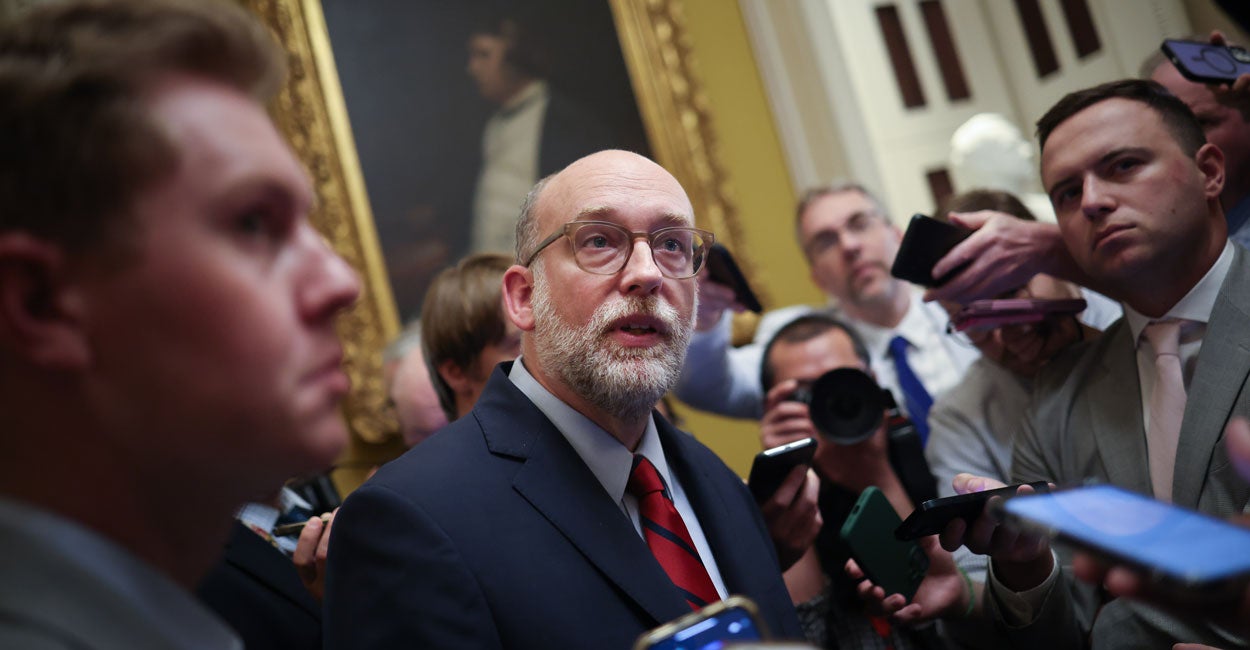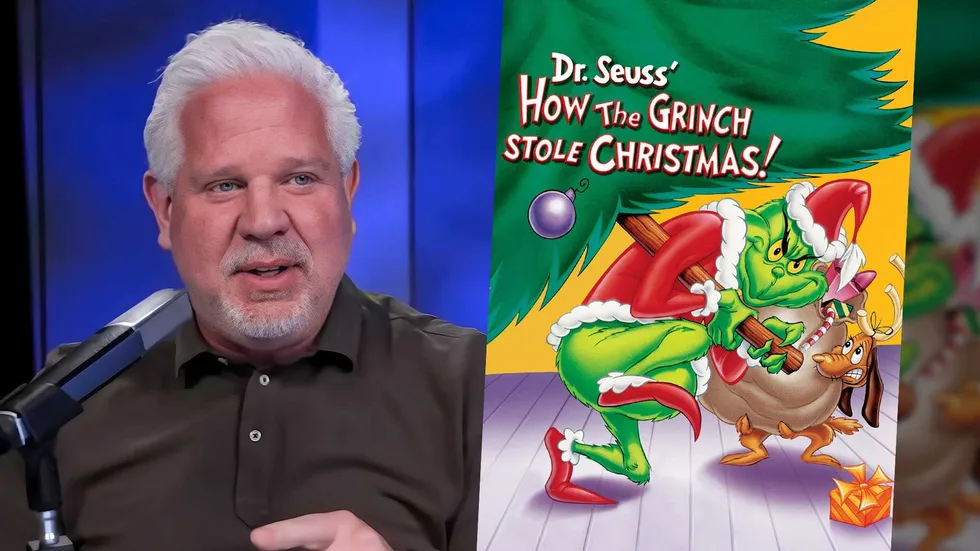What’s at Stake in Rescissions Package?

It required two tie-breaking votes from Vice President JD Vance, but the $9.4 billion rescissions package moved a step closer to passage in the Senate.
Live Your Best Retirement
Fun • Funds • Fitness • Freedom
With a Friday deadline to deliver the rescissions to President Donald Trump, the Senate advanced the spending cuts Tuesday following procedural votes. Three Republican senators—Mitch McConnell of Kentucky, Lisa Murkowski of Alaska, and Susan Collins of Maine—voted with all Democrats in opposition.
The rarely used rescissions process is a way to reduce federal spending. The House of Representatives passed the rescissions package June 12 on a narrow vote of 214-212. It includes cuts to USAID and the Corporation for Public Broadcasting, which funds PBS and NPR.
The Daily Signal spoke with Richard Stern, acting director of The Heritage Foundation’s Institute for Economic Policy Studies and director of its Center for the Federal Budget, about the rescissions package. Stern explained why the rescissions package is a good step for reducing spending and what it means for future cuts.
His interview transcript has been lightly edited for length and clarity.
Philip Roberts: Can you explain the rescissions package? What’s in it?
Richard Stern: Normally, to get a bill through the Senate, you need 60 votes, which obviously most parties never have, and the Republican Party right now doesn’t have.
There are really only a few legislative processes that can be done in the Senate with a majority vote: 50 votes plus the vice president as the tiebreaker without needing all the way up to 60 votes. Now of those different legislative vehicles, though, there are only two that can allow you to actually create new laws.
One of them is a reconciliation bill, which Congress just got done with the One Big Beautiful Bill. But a reconciliation bill will not let you cut discretionary spending. That’s what a rescissions bill does.
Reconciliation can handle mandatory spending and the tax code, but you need a rescissions bill to cut discretionary spending. Discretionary spending is a federal legal term of art in terms of types of spending programs.
One of the important ways of thinking about it is that essentially the entire budget for the regulatory agencies of the federal government is discretionary, along with a bunch of welfare programs and a lot of the programs that the Left has used to fund their priorities.
This rescissions bill is $9.4 billion. It’s kind of across two large buckets. One is literally funding for left-wing political and media operations, like the Corporation for Public Broadcasting, for example.
The other bucket—which is about 80% of the bill—is foreign aid, but obviously an enormous amount of that is really effectively money laundering operations and money that goes to the leaders of countries and not actually the people that are in need.
A certain amount of that money is actually refugee resettlement money, which is money that the Biden administration used—and the Obama administration before them—basically to traffic aliens into the United States and give them a quasi-legal shell to do it.
Those are the major buckets of things that are in this bill. Again, these are things that the conservative movement has been talking about for a while now.
Roberts: What obstacles must the Senate overcome to pass the rescissions package?
Stern: Anytime you cut government spending, there are people who come up and crow that we’re removing benefits from people. There’s always a lot of sensitivity to that.
Even Republican members of both the House and the Senate get queasy whenever that’s on the chopping block. Obviously, one of the attacks from the Left has been, “This is defunding Sesame Street” and stuff like that. Of course, “educational programs” would be cut.
You’ve got this kind of assault saying, “Oh, this is state control of the media” or “This is the right wing going after these education programs” and whatnot. If every single one of the Republicans in Congress were actually a conservative, we wouldn’t have a problem, but some of them get quite squeamish.
The other thing also is on the foreign aid side of it. This is money that seems very sympathetic. On the surface, this is money going to help people that are impoverished in third-world countries.
Yet you have to really know these programs to know that that’s almost entirely not what the programs are spent on or not who benefits from these programs. But on the surface level, it sounds like you’re starving poor kids in a third-world country.
Those are the attacks that the Left is making that Republicans in the House and now in the Senate are trying to maneuver around. That’s why in the Senate, they’re going cut by cut, seeing if they really can get enough Republicans on board given what they think they’re going to run into back home.
Roberts: What happens if the package goes back to the House?
Stern: If it goes back to the House, they have until July 18 to get it to President Trump’s desk. We’ve got a couple days here, but not that many days left.
If it goes back to the House, it probably passes simply because if the Senate’s going to make any amendments, it’s going to get rid of some of the cuts, not to add more cuts.
While there will be a few people in the House who will be angry that the bill is smaller and cuts less money, they’re still probably going to look at it as a win because we are cutting money.
Roberts: What is your response to people who are concerned about the defunding of public broadcasting companies?
Stern: I would say, “Find private funding for it.” There are hundreds of billions of dollars given as charity in the United States every single year.
An enormous amount of that goes to things that are educational—and not just educational at the level of Sesame Street—at the level of sending people out to find people who are long-term unemployed or homeless or have other issues and trying to help them find a job, put their résumé together, learn basic financial literacy.
Why are these handful of completely biased entities privileged by the government? Why is that money not available, for example, to entities that actually help lift people out of poverty and teach them basic skills about holding a job, finding a job, or financial literacy?
What we’ve seen here over decades is this handful of “educational programs” that really just give platforms to some of the worst political movements in the United States, including by the way, gender transitioning material.
You have real, private entities out there actually trying to provide people real skills and trying to lift people out of poverty who find private money for it, while these handful of publicly funded things are wasting taxpayer money stolen from hardworking Americans to then finance “educational programs” that push gender ideology and other things.
When you look at it that way, it’s frankly insulting and disgusting that the Left is pushing this narrative that these are essential programs, or that they are frankly so essential, but that they could not possibly figure out how to fund themselves.
Again, if you’ve got some program that you quite literally cannot find ad revenue or donations for, or any other way to monetize to keep yourself afloat, clearly, it’s not a popular or useful program.
Roberts: If passed, how will this rescissions package affect fiscal policy moving forward?
Stern: Even though the rescissions process has been around for 50 years at this point, it’s really only been used a couple of times. Part of that is just this massive hesitancy to cut the government spending. That comes from both sides of the aisle on any number of issues.
A reconciliation bill can only be done once per fiscal year. There’s no limit to how many rescissions bills you can do.
This would be one of the largest rescissions packages ever. Actually getting it done is a real signal that this Congress and this president, together as a team, are truly serious about cutting government spending and that the door is open to use this process to give money back to the taxpayers that earned it.
That would really be the first time in the half-century history of the rescissions process where there seemed to be that kind of political coalition to actually do this and get this done.
The post What’s at Stake in Rescissions Package? appeared first on The Daily Signal.
Originally Published at Daily Wire, Daily Signal, or The Blaze
What's Your Reaction?
 Like
0
Like
0
 Dislike
0
Dislike
0
 Love
0
Love
0
 Funny
0
Funny
0
 Angry
0
Angry
0
 Sad
0
Sad
0
 Wow
0
Wow
0










































































